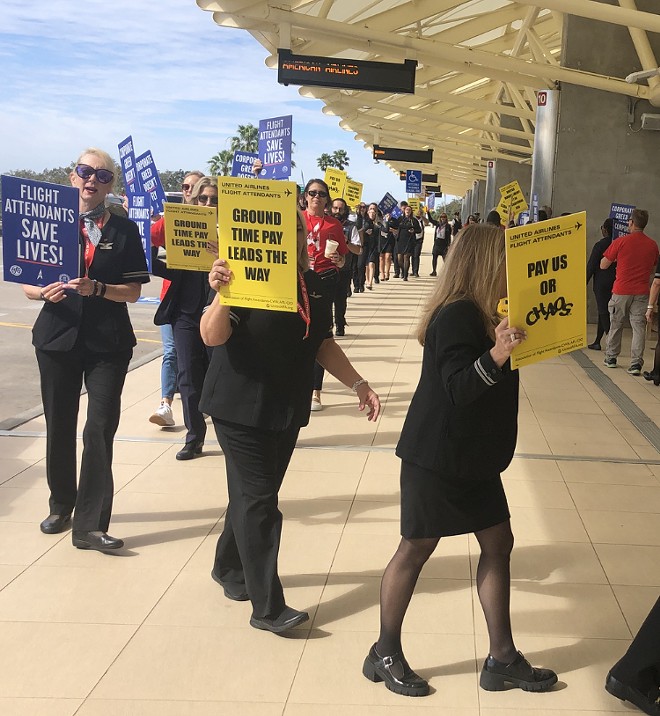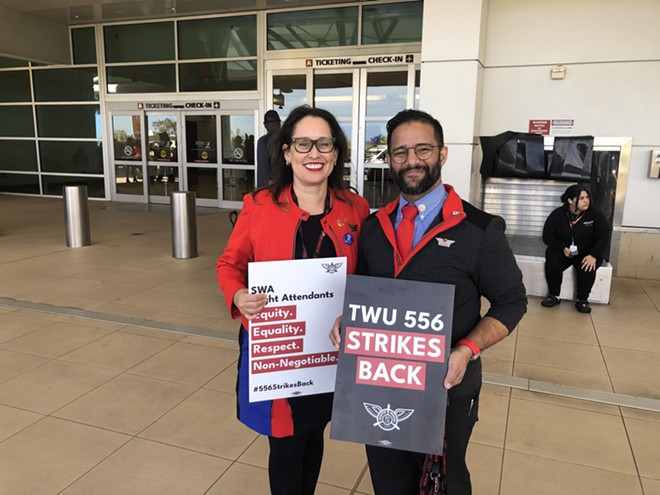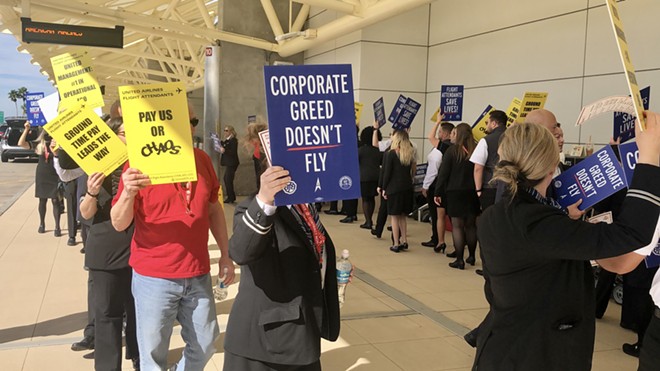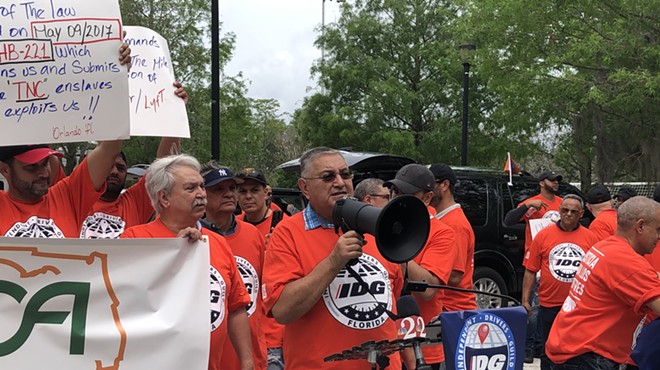
Tuesday’s protest was organized as a call to improve industry standards for flight attendants. It marked a historic act of solidarity by an estimated 100,000 workers represented by three labor unions.
“This was historic in the fact that there are [flight attendants from] several airlines here for the first time ever combined, asking for equality and equity,” said Transport Workers Union Local 579 president Tyesha Best over the chants of flight attendants marching behind her outside of Terminal A. “We’re excited to be standing in solidarity.”
Flight attendants for airlines like American and United are picketing at @MCO as part of a global day of action in solidarity w/ 100,000+ flight attendants in their fight for fair contracts & against corporate greed @afa_cwa @APFAunity @TWU556
— McKenna Schueler (@SheCarriesOn) February 13, 2024
Story TK @OrlandoWeekly pic.twitter.com/slK7Y89muu
Two-thirds of U.S. flight attendants — working for airlines including American Airlines, Southwest, United, Alaska Airlines, Omni and Frontier — are currently in negotiations for new union contracts. The Association of Professional Flight Attendants, representing 26,000 flight attendants for American Airlines, has been in contract talks with the airline since 2019 — and the union workers haven’t received a raise since then.
The same is true for flight attendants with Southwest Airlines, represented by Transport Workers Union, who have been in contract negotiations with the airline for five years. “Airlines are making record profits,” says TWU Local 556 member Claudio Adams, an Orlando-based flight attendant for Southwest Airlines. “The people that are facing customers the longest are the ones least benefiting.”
Airlines are making record profits, while starting wages for flight attendants aren't enough for workers to make ends meet.
tweet this
Adams, who’s worked as a flight attendant for 20 years, says flights have been getting fuller and attendants have been working longer hours with shorter rest times. They act as first responders on flights, essentially — a responsibility that took on even more weight during and after the early years of the COVID-19 pandemic.
As NPR reported this week, flight attendants are generally not compensated until passengers have boarded their flights and the doors to the aircrafts close. That means much of the time they spend in airports between flights is uncompensated, even if they’re still expected to be on-duty. Even the chaotic time spent on the plane shepherding passengers and their bags into seats and overhead bins, typically the most stressful part of any flight, is unpaid.
"One of our things that we're fighting for is that when we show up to work, we're getting paid from the moment that we're required to be there until we leave,” says Randy Hatfield, president of the Association of Flight Attendants-CWA Local 22.
The APFA, representing folks with American Airlines, told NPR they’ve reached an agreement during contract talks that would, at the very least, pay flight attendants for boarding time, similar to Delta.
Delta is the only major airline that does pay flight attendants for boarding time, as of 2022, according to NPR. Delta is also the only major U.S. airline where flight attendants are not unionized.
Flight attendants for the airline publicly launched their own organizing campaign with the Association of Flight Attendants-CWA in 2019 and are still fighting for formal union recognition. Past union drives, with both the AFA-CWA and the International Association of Machinists & Aerospace Workers (IAM), have been unsuccessful, thanks in part to aggressive anti-union campaigns by Delta management over the years, according to In These Times.
Hatfield, with the AFA-CWA, tells Orlando Weekly that it’s new hires who suffer the most from underpayment by the airlines. According to the U.S. Bureau of Labor Statistics, flight attendants earn $37,690 on the low end, while the highest 10 percent earn nearly $100,000 annually. The median wage, as of May 2022, was $63,760.
Hatfield estimates that starting wages for flight attendants, however, are even lower, ranging between $20,000 to $30,000 annually, because the "juniors" are only permitted to work a set amount of hours each month.
That’s nothing close to a livable wage for metro areas like Orlando, where it’s now virtually impossible to find a place to rent below $1,000 a month. Many Florida homeowners, meanwhile, have recently faced skyrocketing property insurance costs, and inflationary pressures have also made it difficult for more working families to make ends meet. Some flight attendants take up side hustles just to pay the bills.

The airline itself reported record revenue of nearly $53 billion last year, generating more than $13 billion in revenue in the fourth quarter alone. United Airlines CEO Scott Kirby, meanwhile, received $9.8 million in total compensation in 2022. The airline similarly reported higher revenue last quarter of $13.6 billion, up 9.9% from 2022.
A multibillion-dollar industry bailout for major airlines, secured through the advocacy of flight attendant union leaders to protect flight attendants’ jobs during the early years of the COVID-19 pandemic, helped keep airlines afloat during a period of significant economic losses.
Now, many airlines — including American Airlines — have recovered and then some. Flight attendants say it’s time, past time even, for them to receive their fair share through fair contracts.
The APFA, for instance, wants an immediate 33% wage increase, telling Orlando Weekly that this is something they’ve been pushing for since 2014.
The airline has offered just one-third of that — an 11% raise, the APFA president told NPR this week. The union has, consequently, sought to increase the stakes by threatening to strike. Under the federal Railway Labor Act, rail and airline workers are prohibited from striking unless they first get permission from federal mediators.
The APFA initiated this process last year, after union members overwhelmingly voted in favor of doing so, but federal mediators through the National Mediation Board rejected their request. They’ve submitted another request and are meeting with federal mediators in March.
The AFA-CWA — which represents roughly 50,000 flight attendants for airlines like United, Frontier, Spirit and Alaska Airlines — similarly isn’t messing around. They've literally trademarked a strategy they call CHAOS: “Creating Havoc Around Our System” (the phrase "Pay us or CHAOS" was visible on some of the picketers’ signs Tuesday).
The union’s CHAOS strategy — possible if and only when the union is authorized by the federal government to strike — involves nontraditional strike actions aimed at leveraging the element of surprise. For instance: directing just a small group of flight attendants (not the entire union workforce) to walk off the job just as a flight is boarding, with no advance notice.
This isn’t dissimilar to what the United Auto Workers did last year in calling strikes at various auto manufacturing plants and parts centers last year — with just hours of advance notice, if that — after Ford, General Motors and Stellantis failed to take the UAW’s strike threat seriously.
According to Reuters, over 98% of Southwest Airlines flight attendants — represented by TWU — voted to authorize a strike last month, shortly after rejecting a tentative agreement reached between Southwest and the union.
Flight attendants wearing pro-union pins and lanyards marched outside ticketing at MCO on Tuesday, carrying signs with phrases like “Corporate greed doesn’t fly” and “Flight attendants save lives.”Representatives of other local unions, like the Communications Workers of America and Unite Here, showed up to the picket in solidarity, along with union pilots and Central Florida Jobs With Justice.
According to the unions, flight attendants staged protests at airports all across the country Tuesday in Tampa, Miami, Atlanta, San Francisco, Boston, Cleveland, Los Angeles and other cities.
“It is amazing — within the last 20 years that I’ve been working, we’ve never seen this,” said Adams, the Southwest flight attendant, in a nod to the scale of the action across multiple unions. “This moment is not about what uniform we wear: It's about what unites us,” the AFA-CWA and APFA stated.
More labor action is coming to Orlando tomorrow
On Wednesday, Uber and Lyft drivers organized with the Independent Drivers Guild similarly plan to rally near the airport as part of a national day of action with the Justice for App Workers coalition in support of fair pay. According to the coalition, participating drivers will not be taking rides to and from the airport all day in Orlando, Tampa, Miami, Hartford, Chicago, Austin, Philadelphia, Pittsburgh and Rhode Island.
The Independent Drivers Guild, a coalition member associated with the Machinists union, first launched its Florida chapter last April.
Rideshare drivers, as independent contractors, don’t have the same legally established union rights as employees under federal law, but that doesn’t mean they can’t organize for better rideshare policies and working conditions, anyway. It has scared companies like Uber enough for them to lobby against organizing efforts to establish union rights for contractors.
Adalberto Perez, a local Uber driver, told Orlando Weekly last week that drivers with the Guild meet regularly. They have a WhatsApp group of over 5,000 rideshare drivers involved in their organizing effort.
In a strike announcement, Justice for App Workers says they are tired of being scared for their safety and worrying about the companies "deactivating" them with no notice or consequences, exhorting their fellow workers, "Let’s come together to fight to transform the industry and improve our lives. We deserve better!"
Subscribe to Orlando Weekly newsletters.
Follow us: Apple News | Google News | NewsBreak | Reddit | Instagram | Facebook | Twitter | or sign up for our RSS Feed





















